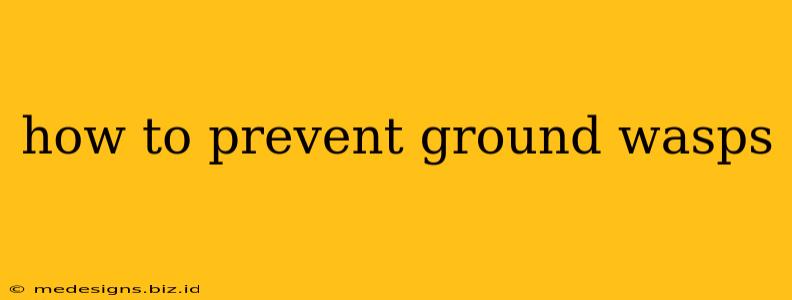Ground wasps, while beneficial in controlling garden pests, can become a nuisance when their nests are located too close to human activity. Their stings are painful, and their presence can be unsettling. This guide provides effective strategies for preventing ground wasp infestations around your home and garden.
Understanding Ground Wasps
Before tackling prevention, it's crucial to understand the creatures you're dealing with. Several wasp species nest underground, including yellow jackets and some digger wasps. Knowing their behavior can help you predict where they might build nests and implement effective preventative measures. Ground wasps are attracted to areas with loose soil, ample food sources (like other insects), and sheltered locations.
Identifying Ground Wasp Nests
Ground wasp nests are often inconspicuous, appearing as small mounds of disturbed earth, sometimes with a tiny entrance hole. They can be located in various places, including:
- Lawns: Often hidden beneath the grass, making them difficult to spot.
- Flowerbeds: Wasps are attracted to flowers and the insects they attract.
- Under decks and sheds: These provide shade and protection.
- Around garden walls: These areas offer both seclusion and access to food sources.
Preventing Ground Wasps: Proactive Measures
Prevention is always better than cure. By taking proactive steps, you can significantly reduce the chances of a ground wasp infestation.
1. Eliminate Food Sources
Ground wasps, like other wasps, are attracted to food. By minimizing food sources around your property, you reduce their attraction. This includes:
- Properly disposing of garbage: Ensure trash cans are tightly sealed and emptied regularly.
- Cleaning up spilled food and drinks immediately: Don't leave food scraps lying around.
- Keeping pet food indoors: Pet bowls attract wasps looking for an easy meal.
- Covering food and drinks outdoors: Prevent wasps from accessing food while you're enjoying outdoor meals.
2. Maintain a Tidy Yard
A clean, well-maintained yard is less appealing to ground wasps.
- Regularly mow your lawn: This reduces the amount of cover available for nest building.
- Remove leaf litter and debris: These can provide nesting materials and shelter.
- Keep grass short and trimmed: This makes it harder for wasps to build nests undetected.
3. Seal Potential Nesting Sites
Ground wasps often choose areas with loose soil for nesting. Sealing potential nesting sites can deter them from building nests.
- Fill in any holes or gaps in your yard: This includes holes in the ground, cracks in pavements, and gaps under decks and sheds.
- Use landscaping fabric: This can prevent wasps from digging in certain areas.
4. Consider Natural Repellents
Some natural substances are known to deter wasps. While not foolproof, they can be used in conjunction with other preventative measures.
- Peppermint oil: The strong scent of peppermint can repel wasps. Dilute peppermint oil with water and spray around potential nesting areas.
- Citrus scents: Similar to peppermint, citrus scents can also be effective deterrents.
What to Do If You Find a Nest
If you discover a ground wasp nest, do not attempt to remove it yourself. Ground wasps can be aggressive when their nest is disturbed, leading to multiple stings. Instead, contact a pest control professional. They have the expertise and equipment to safely remove the nest without putting yourself at risk.
Conclusion
Preventing ground wasps requires a multi-pronged approach. By implementing these preventative measures and staying vigilant, you can significantly reduce the likelihood of encountering these stinging insects on your property, allowing you to enjoy your outdoor spaces without fear. Remember, early intervention and professional assistance when necessary are key to keeping your home wasp-free.
